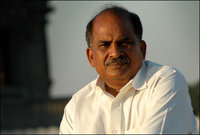
Without international investigation accused will become judge: CPI
[TamilNet, Sunday, 11 March 2012, 22:25 GMT]
The Tamil Nadu Assistant Secretary of the Communist Party of India (CPI), Mr C. Mahendran in an interview to Junior Vikatan this week, rejected a statement by the Marxist Communist Party (CPM) central committee member and parliamentarian, TK Rangarajan saying that there is no need for an international investigation on Sri Lanka. Mr Rangarajan’s statement has found opposition even inside his party. Commenting, Mahendran said, he was surprised and he didn’t understand that in what sense Rangarajan had made the statement. Rangarajan should realise that expecting Sri Lanka to conduct the investigations is like appointing the murderer as the judge to deliver justice, Mahendran said.
When the communist ideology argues for the right of even recalling elected representatives, Rangarajan rejecting the idea of conducting a referendum among Eezham Tamils, is contradictory and surprising, Mahendran said.
What is happening in Sri Lanka is a historically continuing genocide. Annihilation of the identity of Tamils is the long-term agenda of the Sinhala chauvinists. It started with the disenfranchisement of plantation Tamils immediately after the independence.

C. Mahendran, the Tamil Nadu assistant secretary of the Communist Party of India (CPI)
Tamils in the island have been fighting through peace means for 35 years and deploying militancy in the next 25 years, just for their fundamental political rights.
In the last days of the war alone, 40,000 were killed in a war without witnesses. How come Rangarajan, a parliamentarian, is unaware of it?
The argument that a genocide crime has to be resolved internally could never be accepted. The international organisations like the UN, International Court of Justice and the UNHRC have been created just to see no state should breach the limits. The international communist movement played an important role in the creation of these institutions.
One could come out with ample evidence to prove why Sri Lanka will not resolve the crisis. If every country were left to resolve issues domestically, many of them would go back to the times of savagery. TKR rejecting international option is surprising, Mahendran observed.
* * *Why the CPM is on record for opposing the liberation of genocide-affected Eezham Tamils is a puzzle for many.
Those who theoretically explain the phenomenon cite its Stalinist orientation that favours Indian imperialist solutions rather than liberations inside and in the neighbourhood. They cite at the stand of the party on the North Eastern Frontier nations in India and on the war in the tribal belt.
But there are the others who cite at the social structure of the party that is paranoid especially at the national question of Eezham Tamils.
The CPM strongholds are in the states of West Bengal and Kerala in India.
In Kerala the undivided Communist Party came to power in 1957 itself.
After the Russia–China divide of 1960s, the CPM was long dominating the State of West Bengal. It was the ruling force that took up the issue of the liberation of Bengalis in Bangladesh in 1971.
People of Kerala in the long run will be much benefited and will find conducive milieu in the neighbourhood, if on their own they take an articulating stand supporting the universally righteous question of Eezham Tamils, revolting against their own elite in New Delhi and parties like the CPM, is a strong opinion in Tamil Nadu.
The CPM polity is very close to The Hindu establishment in Chennai, is widely known in the circles of political observers.
Chronology:








